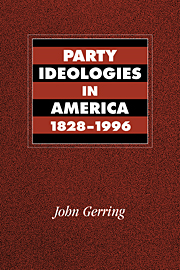Book contents
- Frontmatter
- Contents
- List of Figures and Tables
- Acknowledgments
- Part I Introduction: The Existence of Party Ideology
- Part II The Whig-Republican Party
- Part III The Democratic Party
- Part IV Conclusions: Sources of Party Ideology
- 8 What Drives Ideological Change?
- Epilogue: 1996
- Appendix The Search for a Method
- Selected Bibliography
- Index
8 - What Drives Ideological Change?
Published online by Cambridge University Press: 05 June 2012
- Frontmatter
- Contents
- List of Figures and Tables
- Acknowledgments
- Part I Introduction: The Existence of Party Ideology
- Part II The Whig-Republican Party
- Part III The Democratic Party
- Part IV Conclusions: Sources of Party Ideology
- 8 What Drives Ideological Change?
- Epilogue: 1996
- Appendix The Search for a Method
- Selected Bibliography
- Index
Summary
The previous chapters have attempted to show that there are plausible grounds for regarding the American parties as ideologically motivated. What, then, might account for the content of American party ideology? What mechanisms, pressures, or concerns drive the formation and periodic reformation of ideology within these party organizations?
Work on this question is diverse. Studies employ a wide range of indicators, focus on different periods of American history, and ask different questions of the historical record. Nonetheless, it is possible to distinguish four general theories of party conflict in America: classical, social-class, ethnocultural, and realignment. This chapter explores these frameworks in light of the empirical findings of this study. I conclude with a few general observations about what “causes” party ideology.
The Classical Theory
Of politics in the Roman republic, Cicero wrote, “Those who have wished their deeds and words to be pleasing to the multitude have been held to be populares, and those who have conducted themselves in such a manner that their counsels have met the approval of all the best men have been held to be optimates.” Whether we classify these groupings as parties or factions, it is clear that for many in the Roman republic, politics was understood as a battle between the rabble-rousers and the better sort, between the democrat (in its older, classical meaning) and the aristocrat. A millennium later, David Hume described political struggle in England in remarkably similar terms.
- Type
- Chapter
- Information
- Party Ideologies in America, 1828–1996 , pp. 257 - 275Publisher: Cambridge University PressPrint publication year: 1998



